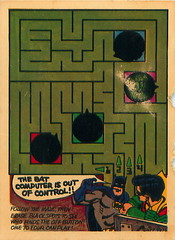When Quora announced earlier this month that they were eliminating their policy against self-promoting questions and answers, some analysts wondered if that was opening the gates for spammers to dominate the conversation. The reality is that the whole evolution of Q&A services is not much different from what Google and other search engines have been experiencing throughout the years. It’s a battle to separate the wheat from the chaff, where the chaff keeps finding creative ways to look like the wheat. Keep reading, and you’ll find why developing the perfect Q&A engine should not be our real objective here.
As a kid, I spent my fair number of hours watching re-runs of camp TV shows, including the classic Batman TV series from the 60’s. I remember how the batcomputer was able to answer any question you asked it, no matter how weird or convoluted they were. For those of you who never had the privilege (?) to see the precursor of IBM’s Watson, here it is, courtesy of YouTube (it’s a long video, so I’m taking you directly to the 2:20 mark):

Image by andertoons via Flickr
Yes, you saw it right. The bat-computer was fed a bunch of alphabet soup letters and gave the dynamic duo the answer they were looking for, where they should go next to complete their mission. However, as a sign of things to come, Batman then tries to go extreme and feeds the bat-computer with the Yellow Pages directory book, but—oh the horror—the batcomputer fails miserably trying to get them a more precise answer for their subsequent question.
More than 40 years later, our quest for the infallible computer has not changed much. Watson could easily answer Jeopardy! questions about song lyrics and book topics, but choked when facing more nuanced themes. That was not very different from the 18th century “Mechanical Turk”, which was capable of winning chess games, solving puzzles, conversing in English, French and German and even answering questions about people’s age and marital status, but had its fair share of defeats.
I concede that services like Wolfram Alpha, ChaCha and Quora raised the bar compared to early players such as Yahoo! Answers and WikiAnswers, but they all come short to address complex, subtle or fringe questions.
If you don’t believe me, just try yourself. Use your favorite online Q&A service to ask a question that you can’t easily find in Wikipedia or via a quick Google search and let me know if you get anything meaningful back.
Quora gave many of us the hope that we would be finally getting a high-quality, well-curated Q&A service. It’s becoming increasingly clear now that, albeit a step forward, Quora is not the know-all oracle that we were looking for.
Are we going to ever find the perfect Q&A service, where more nuanced questions will get satisfactory responses? My guess is “no”, but not even Adam West’s noodle-eating batcomputer would know the answer for that.
In fact, at the end of the day, that answer is not relevant at all. As we make strides in the information technology journey, our fundamental objective is not to replace people with machines. Our real target is to free us all from as many mundane and “automatable” tasks as possible, so that we can focus our efforts and energy more and more on the tasks that only humans can do. Having increasingly smarter systems that can answer most of our trivial questions are not a sign of our defeat to “our new computer overlords.” It’s rather a great opportunity to re-define what being human actually means.





